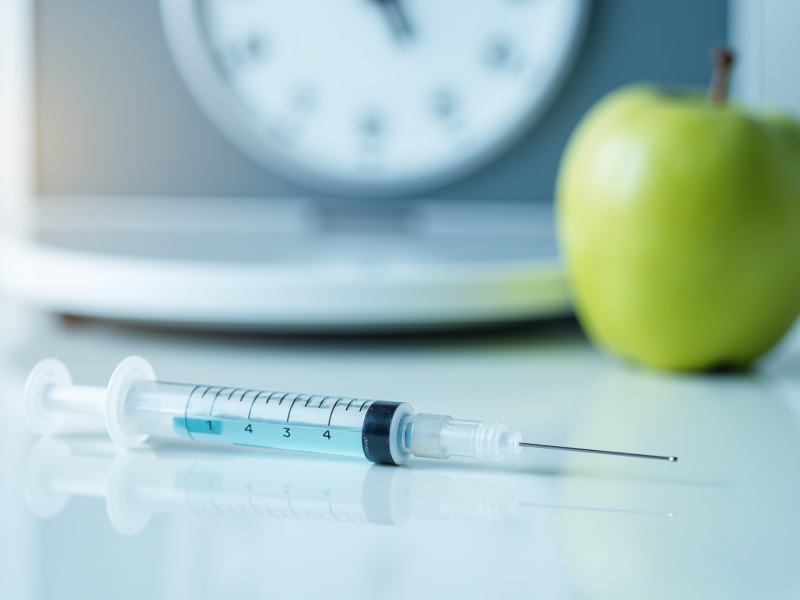Overview
Weight loss shots, particularly GLP-1 receptor agonists like semaglutide, present significant advantages for individuals aiming for sustainable weight loss, especially those dealing with obesity or weight-related health issues. These injections effectively reduce appetite and improve metabolic health. Additionally, the article discusses potential risks and identifies suitable candidates for treatment, rendering these shots a practical option for many, particularly women experiencing hormonal changes.
Introduction
As the quest for effective weight management solutions intensifies, the emergence of weight loss injections has sparked considerable interest among individuals seeking sustainable results. These innovative therapies, particularly GLP-1 receptor agonists, promise significant benefits, including substantial weight reduction and improved metabolic health. However, as with any medical intervention, they come with their own set of risks and challenges.
Understanding who stands to gain the most from these injections and what precautions should be taken is essential. This article delves into the multifaceted world of weight loss shots, exploring their mechanisms, advantages, potential side effects, and the ideal candidates for this transformative approach to health.
Define Weight Loss Injections and Their Mechanism of Action
Substances that reduce mass, particularly receptor agonists such as semaglutide (Ozempic, Wegovy), are effective weight loss shots for controlling body size. These medications mimic the glucagon-like peptide-1 hormone, which plays a crucial role in appetite regulation and glucose metabolism. By activating GLP-1 receptors, these injections facilitate several key actions:
- Reduce Appetite: They communicate with the brain to induce feelings of fullness, thereby decreasing hunger and overall food intake.
- Slow Gastric Emptying: This mechanism prolongs the sensation of fullness after meals, leading to reduced calorie consumption.
- Enhance Insulin Secretion: They stimulate insulin release in response to food intake, aiding in blood sugar management.
These combined effects can lead to a significant reduction in body mass, often exceeding 20% in some patients, particularly when weight loss shots are integrated with lifestyle changes. As more individuals seek sustainable methods for managing their health, the importance of these therapies continues to rise within medical practice.
Explore the Benefits of Weight Loss Injections
Weight loss shots offer numerous benefits, especially for women undergoing hormonal changes during perimenopause and menopause. Notable advantages include:
-
Significant Weight Loss: Clinical trials reveal that individuals utilizing GLP-1 injections can achieve an average weight reduction of 15% to 20% over a year. For example, in the SURMOUNT-1 trial, perimenopausal women experienced a notable 23% decrease in body mass, compared to only 3% in the placebo group. Tyde Wellness provides full-strength medications tailored to individual needs, ensuring effective support through weight loss shots.
-
Enhanced Metabolic Wellness: These treatments not only assist in body mass reduction but also improve metabolic health. Participants have reported better blood sugar regulation, lower blood pressure, and improved lipid profiles, collectively reducing the risk of chronic diseases. For instance, studies indicate that tirzepatide significantly lowers waist circumference, with reductions of 20 cm compared to 5 cm in the placebo group for perimenopausal women, a crucial indicator of cardiometabolic health. Tyde Wellness’s personalized programs include access to expert doctors and health coaches to optimize metabolic outcomes.
-
Enhanced Quality of Life: Many users of GLP-1 therapy report increased energy levels, improved mood, and heightened self-confidence as they achieve their weight loss shots goals. Dr. Beverly Tchang emphasizes that these medications are effective during menopause, providing reassurance for women navigating life transitions. With Tyde Wellness, patients receive personalized nutrition plans and realistic exercise strategies to further enhance their quality of life.
-
Sustainable Results: Unlike temporary solutions offered by trendy diets, these slimming treatments promote gradual and lasting weight reduction, encouraging long-term lifestyle adjustments. Research indicates that participants can maintain significant weight loss, with some achieving over 20% reduction within a year. Tyde Wellness supports this journey with regular check-ins from care teams to ensure progress and accountability.
-
Consideration of Side Effects: While GLP-1 treatments offer many benefits, it is essential to acknowledge potential side effects, such as gastrointestinal issues, which are common with these therapies. Tyde Wellness provides extensive assistance to help manage these side effects, ensuring patients can make informed choices about their treatment options. The program is available for $139/month plus insurance copay, making it accessible for those seeking effective solutions.
These compelling advantages position weight loss shots, especially through Tyde Wellness’s customized programs, as a practical and effective choice for women seeking lasting solutions to weight management challenges.
Assess the Risks and Side Effects of Weight Loss Injections
Weight loss shots, especially GLP-1 receptor agonists, offer notable advantages, yet they also pose significant risks and potential side effects. Commonly reported issues include:
- Gastrointestinal Issues: Many patients report experiencing nausea, vomiting, diarrhea, and constipation, especially during the initial treatment phase. These symptoms can be distressing and may lead to discontinuation of therapy in some cases.
- Injection Site Reactions: Redness, swelling, and pain at the injection site are frequent complaints, which can impact patient adherence and overall satisfaction with the treatment.
- Pancreatitis Risk: There is a concerning potential for pancreatitis, a serious condition that requires immediate medical attention. Although not all instances of pancreatitis have been definitively linked to weight reduction medications, the risk remains a critical consideration.
- Kidney Concerns: Users may encounter kidney-related issues, particularly if dehydration occurs due to gastrointestinal side effects. This underscores the importance of maintaining adequate hydration during treatment.
Healthcare providers stress the importance of discussing individual medical histories before initiating weight loss shots. This dialogue facilitates the evaluation of individual risk factors and ensures that patients are well-informed about the safe application of therapy for reducing body mass. As the popularity of GLP-1 medications continues to rise, understanding these risks is essential for making informed decisions regarding management options.
Identify Suitable Candidates for Weight Loss Injections
Weight loss injections are typically recommended for individuals who meet specific criteria, including:
-
Body Mass Index (BMI): Candidates generally have a BMI of 30 or higher, indicating obesity, or a BMI of 27 or higher with weight-related health conditions such as hypertension or type 2 diabetes. This aligns with current guidelines that emphasize the importance of BMI in determining eligibility for medication aimed at reducing body mass.
-
Prior Efforts for Reducing Mass: Many individuals seeking these treatments have previously attempted various methods for weight loss shots without achieving significant results. Statistics indicate that nearly 25% of individuals in specialized programs may have undiagnosed disordered eating, highlighting the complexities involved in managing body mass effectively.
-
Health Considerations: Individuals with obesity-related health issues can derive substantial benefits from weight loss shots, as these therapies not only facilitate weight reduction but also improve overall health outcomes. For instance, research shows that patients using weight loss shots with semaglutide can lose an average of 15% of their body mass when combined with lifestyle changes, significantly enhancing metabolic health.
Women experiencing hormonal changes, particularly during perimenopause or menopause, may find these injections particularly beneficial. They address both weight management and associated health concerns, providing a comprehensive approach to well-being during these critical life stages. Tyde Wellness provides safe GLP-1 options that, when combined with tailored fitness plans, supportive nutrition, and hormone balance coaching, empower women to take charge of their health and achieve sustainable results with weight loss shots. It is essential for candidates to undergo a thorough medical evaluation to exclude any contraindications before commencing treatment.
Conclusion
Weight loss injections, particularly GLP-1 receptor agonists, present a promising solution for individuals pursuing effective and sustainable weight management. These medications leverage appetite regulation and metabolic enhancement to achieve significant reductions in body mass, making them an appealing option for many, particularly women undergoing hormonal changes during perimenopause and menopause.
The article underscores several key benefits of weight loss injections, including:
- Substantial weight loss
- Improved metabolic health
- Enhanced quality of life
- The potential for sustainable results
While these treatments carry certain risks, such as gastrointestinal issues and the possibility of pancreatitis, the personalized support provided by programs like Tyde Wellness enables candidates to navigate these challenges effectively. Moreover, identifying suitable candidates based on criteria such as BMI and previous weight loss efforts is essential for maximizing the advantages of these injections.
Ultimately, weight loss injections offer a viable path for individuals grappling with obesity and related health conditions. As awareness of their effectiveness expands, individuals are encouraged to explore these options, engage in open discussions with healthcare providers, and contemplate how such treatments can be integrated into a comprehensive strategy for health and well-being. Embracing this innovative approach could lead to transformative changes, empowering individuals to regain control over their health and achieve lasting results.
Frequently Asked Questions
What are weight loss injections?
Weight loss injections are substances, particularly receptor agonists like semaglutide (Ozempic, Wegovy), that help reduce body mass by mimicking the glucagon-like peptide-1 hormone, which regulates appetite and glucose metabolism.
How do weight loss injections work?
These injections work by activating GLP-1 receptors, which leads to several key actions: reducing appetite, slowing gastric emptying, and enhancing insulin secretion in response to food intake.
What effect do weight loss injections have on appetite?
They communicate with the brain to induce feelings of fullness, which decreases hunger and overall food intake.
How do weight loss injections affect gastric emptying?
They slow gastric emptying, prolonging the sensation of fullness after meals and leading to reduced calorie consumption.
Do weight loss injections help with blood sugar management?
Yes, they enhance insulin secretion in response to food intake, aiding in blood sugar management.
What is the potential weight loss percentage associated with these injections?
Patients can experience a significant reduction in body mass, often exceeding 20%, especially when these injections are combined with lifestyle changes.
Why are weight loss injections becoming more important in medical practice?
As more individuals seek sustainable methods for managing their health, the importance of these weight loss therapies continues to rise within medical practice.
List of Sources
- Define Weight Loss Injections and Their Mechanism of Action
- The weight-loss drugs being tested in 2025: will they beat Ozempic? (https://nature.com/articles/d41586-025-00376-w)
- A look at the future of weight loss injections (https://plasticsurgery.org/news/articles/a-look-at-the-future-of-weight-loss-injections)
- Weight-loss injections: How do drugs like Wegovy and Mounjaro work? (https://bbc.com/news/articles/c981044pgvyo)
- How does Ozempic work? Understanding GLP-1s for diabetes, weight loss, and beyond – Harvard Health (https://health.harvard.edu/staying-healthy/how-does-ozempic-work-understanding-glp-1s-for-diabetes-weight-loss-and-beyond)
- Cleveland Clinic Research Finds Injectable Medications for Obesity Produce Smaller Weight Loss in A Real-World Setting, Compared to Randomized Clinical Trials (https://newsroom.clevelandclinic.org/2025/06/10/cleveland-clinic-research-finds-injectable-medications-for-obesity-produce-smaller-weight-loss-in-a-real-world-setting-compared-to-randomized-clinical-trials)
- Explore the Benefits of Weight Loss Injections
- Women in Menopause Benefit From GLP-1 Weight-Loss Medications as Much as Younger Women | Research | Advances in Endocrinology, and Women’s Health | NewYork-Presbyterian (https://nyp.org/advances/article/women-in-menopause-benefit-from-glp-1-weight-loss-medications-as-much-as-younger-women)
- Monthly Obesity Shot Shows Big Weight Loss in Trial (https://usnews.com/news/health-news/articles/2025-06-25/monthly-obesity-shot-shows-big-weight-loss-in-trial)
- Monthly weight loss drug helps people lose 20% of body weight, trial finds (https://nbcnews.com/health/health-news/monthly-weight-loss-drug-helps-people-lose-20-body-weight-trial-finds-rcna214080)
- One-Year Weight Reduction With Semaglutide or Liraglutide in Clinical Practice – PMC (https://pmc.ncbi.nlm.nih.gov/articles/PMC11400221)
- Assess the Risks and Side Effects of Weight Loss Injections
- Do weight-loss injections reduce or increase your health risks? (https://bhf.org.uk/informationsupport/heart-matters-magazine/news/behind-the-headlines/weight-loss-injections)
- FDA’s Concerns with Unapproved GLP-1 Drugs Used for Weight Loss (https://fda.gov/drugs/postmarket-drug-safety-information-patients-and-providers/fdas-concerns-unapproved-glp-1-drugs-used-weight-loss)
- Weight loss jabs study begins after reports of pancreas issues (https://bbc.com/news/articles/c4ged0r1n3wo)
- Serious side-effects for popular weight loss drugs raising concerns (https://komonews.com/news/spotlight-on-america/serious-side-effects-for-popular-weight-loss-drugs-raising-concerns-risk-benefits-health-obesity-glp1-zepbound-wegovy-mounjaro-semiglutide-medication)
- Identify Suitable Candidates for Weight Loss Injections
- Weight Loss Drugs 101: Benefits and risks you need to know before picking up a prescription (https://vcuhealth.org/news/weight-loss-drugs-101-benefits-and-risks-you-need-to-know-before-picking-up-a-prescription)
- Semaglutide Weight Loss Programs for 2025 (https://intentionalselfaesthetics.com/semaglutide-weight-loss-programs-in-2025)
- Who Should Take Weight Loss Injections, and Who Shouldn’t? (https://news-medical.net/health/Who-Should-Take-Weight-Loss-Injections-and-Who-Shouldne28099t.aspx)
- Top Weight Loss Medications (https://obesitymedicine.org/blog/weight-loss-medications)



